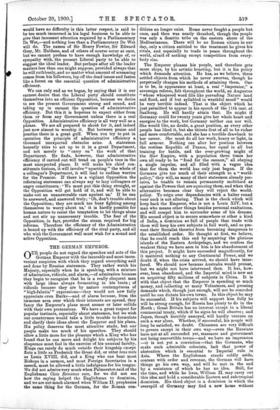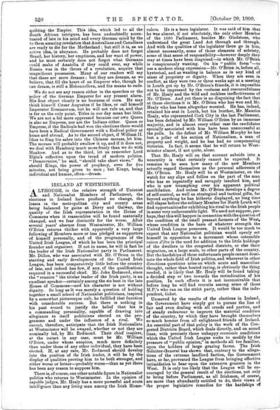THE GERMAN EMPEROR.
0"people do not regard the speeches and acts of the German Emperor with the incurable and most incon- venient suspicion with which they regard everything said and done by Russian statesmen. They rather watch his Majesty, especially when he is speaking, with a mixture of admiration, ridicule, and alarm,—of admiration because they begin to recognise that he is a really eloquent man with large ideas always fermenting in his brain ; of ridicule because they are by nature contemptuous of " high-falutiu' " expressions—they would not now fully appreciate even Burke—and of alarm because, from the immense area over which their interests are spread, they fancy the Emperor's plans must sooner or later collide with their own pretensions. We have a great respect for popular instincts, especially about statesmen, but we wish our countrymen would take a little trouble to formulate and clarify their ideas about the Emperor and his plans. His policy deserves the most attentive study, but our people make too much of his speeches. They should allow a little more for the pleasure which a King who has found that he can move and delight his subjects by his eloquence must feel in the exercise of his unusual faculty. Kings can rarely do much outside their kingship except flute a little as Frederick the Great did, or utter bons ntots as Louis XVIII. did, and a King who can beat most Bishops in a sermon, and most Foreign Secretaries in a speech, must be allowed a little indulgence for his tongue. We did not admire very much when Palmerston said of the Englishman Civis Romanus sum, for we did not see how the saying helped the Englishman to dominion, and we are not much alarmed when William II. prophesies the same thing for the German, for the Roman con- ditions no longer exist. Rome never fought a, people but once, and then was nearly thrashed, though the people was only a Semitic tribe on the eastern shore of the Mediterranean. There will be no Roman citizen in our day, only a citizen entitled to the treatment he gives his rivals, and especially to trade in peace throughout the world, afraid of nothing except competition from every- body else.
The Emperor pleases his people, and therefore gets more ships, by his artistic boasting, but it is his policy which demands attention. He has, as we believe, three settled objects from which he never swerves, though he perpetually changes his methods of attaining them. One is to be, in appearance at least, a, real " Imperator," a sovereign referee, felt throughout the world, an Augustus "whose whispered word fills like pervading Nature land. and flood, and if but syllabled in wrathful mood" would be very terrible indeed. That is the object which he just permitted to appear in his speech of the 11th inst. at Saalburg. He will hardly attain that. He might if Germany could for twenty years give her whole heart and energies to the work, but Germany neither can nor will She would like, no doubt, a great position as every other people has liked it, but she thirsts first of all to be richer and. more comfortable, and she has a terrible drawback to her career. She must do all her work, heavy or light, in full armour. Nothing can alter her position between the restless Republic of France, her equal in all but training for battle, and the ever-growing might of the Slav Empire, with a population three times her own all ready to be "food for the cannon," all obeying a single impulse, and all filled with a vague idea that for them the world. has only just begun. If the Germans give too much of their strength to a "world- policy," they will, as many of their statesmen already per- ceive, be unable to remain permanently mobilised as against the Powers that are squeezing them, and when that alternative becomes clear they will reject the world- policy. To reign over dependencies with a halter round your neck is not alluring. That is the check which will keep back the Emperor, who is not a Louis XIV. but a man who means other things besides personal exaltations, and will compel him to surrender some of his dreams. His second object is to secure somewhere or other a kind of India, a dominion so full of people that trade with them will keep his own subjects in full work, and so pre- vent their Socialist theories from becoming dangerous to the established order. He thought at first, we believe, that he could reach this end by acquiring the glorious islands of the Eastern Archipelago, and we confess the weakest thing we have seen in him is his abandonment of this project. It might have succeeded magnificently, for it mattered. nothing to any Continental Power, and we doubt if, when the crisis arrived, we should have inter- fered. We should now because Australia would protest, but we might not have intervened then. It has, how- ever, been abandoned, and the Imperial mind is now set on acquiring fifty millions of subjects in China. It is with that object that the Emperor is spending so much money, and collecting so many Volunteers, and pressing demands which, though just enough, will not be conceded until he can dictate his own terms. In this object he may be successful. If his subjects will support him fully he will be strong enough, for Russia has plenty to do in the North ; Great Britain has no interest except in a liberal commercial treaty, which if he signs he will observe; and Japan, though horribly annoyed, will hardly venture on such a war alone. Whether, if successful, his people will long be satisfied, we doubt. Chinamen are very difficult to govern except in their own way—even the Russians have not at all succeeded yet, massacre and government not being convertible terms—and we have an impression —it is not yet a conviction—that the Germans, who make such admirable colonists, lack that power of abstention which is essential to Imperial rule in Asia. Where the Englishman stands coldly aside, content with order and revenue, the German will have things go his own way, and will be met in the end. by a resistance of which he has no idea. Still, for the time, and while he lives, William II. may carry out this idea and hold a considerable Eastern and sub-tropical dominion. His third object is a dominion in which the overspill of Germany may find a new home without quitting the Empire. This idea, which led to all the South African intrigues, has been undoubtedly accen- tuated of late in his mind and every German mind by the to them amazing revelation that Australians and Canadians are ready to die for the Motherland ; but still it is, as an active idea, in abeyance. He probably does not forget Brazil, her history, her emptiness, and her want of power, and he most certainly does not forget what Germans could .make of Anatolia if they could ever, say while Russia was in the throes of a revolution, acquire that magnificent possession. Many of our readers will say that these are mere dreams ; but they are dreams, as we believe, that fill the heart of an Emperor who, though he can dream, is still a Hohenzollern, and fits means to ends.
We do not see any reason either in the speeches or the policy of the German Emperor for any present alarm. His first object clearly is no business of ours. He may think himself Ccesar Augustus if he likes, or call himself Imperator Romanorum, but he will not rule us, and that is for us the only point. Titles in our day mean but little. We are not a bit more oppressed because our own Queen is also an Empress, nor are the Indians either. Queen or Empress, if the Radicals had won the elections there would have been a Radical Government with a Radical policy at home and abroad. As to the second object, if William II. likes to fling his sabre into the Chinese morass, let him. The morass will probably swallow it up, and if it does not, we 'deal with Hamburg much more freely than we do with Hankow. And as to the third, let us remember Lord Elgin's reflection upon the trend of modern politics. "Democracies," he said, "should take short views." So should Kings, the power of prophecy, even for five minutes, not being given to men ; but Kings, being individual and human, often—dream.







































 Previous page
Previous page